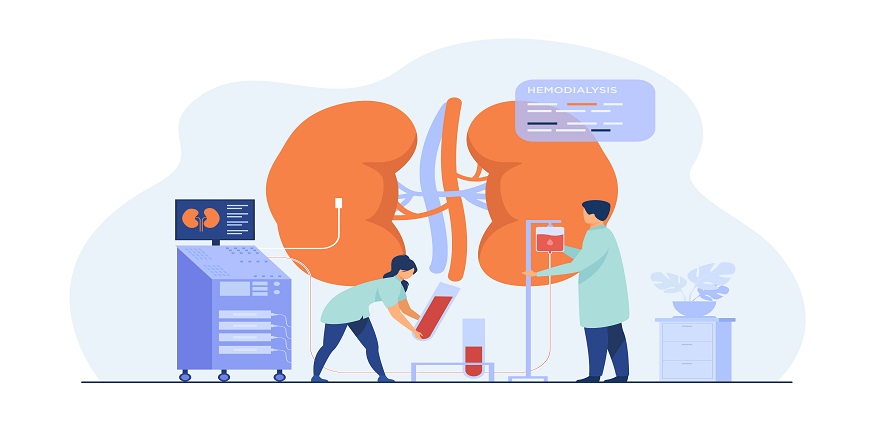


Max Lab
May 25, 2022
The kidneys are two bean-shaped organs in the human body, hardly bigger than a fist; but they play a crucial role in helping maintain good health. The main function of the kidney is removing toxins, waste, and excess fluids from the blood. They also help control blood pressure, stimulate the production of red blood cells, and regulate essential blood chemicals in the body.
Kidney damage can affect their functioning, leading to an accumulation of waste and toxins in the body, which in turn may cause a number of other health issues. This medical condition is known as chronic kidney disease (CKD).
In simple words, CKD is a disease where the kidneys have suffered damage and are unable to filter blood properly. This condition progresses gradually and can go undetected for a long period of time. CKD has a significant impact on kidney function and if not dealt with in time, may also lead to kidney failure.
Here are some of the most common conditions and diseases that CKD can lead to:
In many cases, this condition goes undetected for long periods, as most people do not develop any symptoms in the early stages of CKD. The symptoms of chronic kidney disease can include:
Most of the symptoms of chronic kidney disease may also indicate other kinds of kidney disorders, so it is important to consult a doctor for a proper diagnosis of the same.
Diabetes and high blood pressure are two of the most common causes of chronic kidney disease. Apart from these, other issues that can lead to CKD include:
In CKD, kidney damage and GFR are used to determine which stage the disease has reached. The Glomerular Filtration Rate or GFR is a value that determines how well a person’s kidneys are working and whether they are filtering the blood efficiently. However, the normal GFR values can vary from one person to another as well, depending on the body size, age, and gender.
Generally, CKD can be categorized into 5 stages.
Stage 1
When the GFR is more than 90 millilitres per minute (ml/min) per 1.73 meters square (m2), it shows that the kidneys are functioning well. However, it also indicates some kind of kidney disorders and is considered stage 1 of CKD.
Stage 2
A GFR value ranging between 60–89 ml/min per 1.73 m2 indicates additional kidney damage and is labelled as stage 2 of chronic kidney disease.
Stage 3
In stage 3 of CKD, a person’s GFR value ranges between 30–59 ml/min per 1.73 m2. This stage is further divided into two sub-categories:
Many people start developing a few symptoms of chronic kidney disease as soon as they reach this stage and need to start consultation about how to prevent kidney failure and stop the disease from progressing. The common symptoms that can be noticed at this point include swollen hands and feet, back pain, frequent urination, anaemia, high BP, and bone diseases.
Stage 4
When a person’s GFR value ranges between 15–29 ml/min per 1.73 m2, they are considered to be in stage 4 of chronic kidney disease. At this point, the kidneys have been severely damaged, and the symptoms start becoming more evident.
Stage 5
In Stage 5 of CKD, a person’s GFR drops to 15 ml/min per 1.73 m2. This is when the kidneys have either failed or are close to failing. Major symptoms of kidney failure include itching, muscle cramps, nausea, vomiting, difficulty in sleeping, and breathing issues.
When a person experiences signs that indicate CKD, the doctor may ask them to get a number of tests done, including a kidney function test. This is done to determine if the person’s kidneys are functioning properly. Other tests that a doctor may ask to get performed include:
When it comes to the treatment of chronic kidney disease, the main thing one should know is that the damage caused to a person’s kidneys cannot be reversed. However, people can undergo some therapies or treatment for chronic kidney disease to manage the symptoms, reduce the risks of complications, and slow the progression of the condition.
In the case of kidney failure, the only options are to either undergo dialysis or get a kidney transplant.
How to prevent kidney damage will depend on the person’s overall health and on the stage their CKD is at, and treatment may involve making certain changes like following a proper diet or they may be prescribed NSAIDs (non-steroidal anti-inflammatory drugs.






Comments